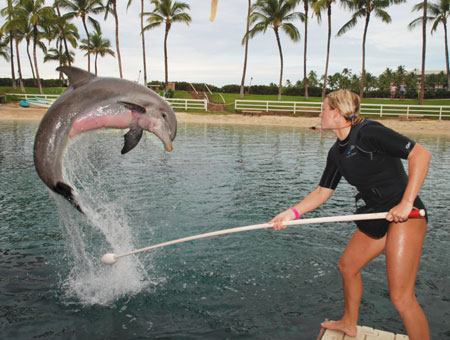TOP 5 TIPS FOR BREAKING INTO THE MARINE MAMMAL TRAINING FIELD

By Danielle, Animal Trainer
“You are so lucky, you play with dolphins all day!” “You have my dream job!” These are statements that marine mammal trainers hear on a daily basis. It’s true. We have the privilege of truly amazing, and rewarding careers, which we work hard at, and pursue passionately. That said, we worked just as hard to get these jobs. Breaking into the marine mammal training field isn’t easy. There are far more people that want to be marine mammal trainers than there are positions available. Based simply on the laws of supply and demand, this is by definition a competitive field. Remember, oftentimes the first step is not a paying job, but an educational training internship that can lead to a long and fruitful career.
Here are five tips for breaking in to the marine mammal training field:
1 – Get a 4-year degree
Most zoos, aquariums and marine parks require that their animal training professionals hold a four-year degree. One very common misconception is that a degree in Marine Biology is the best educational background for a career as a marine mammal trainer. In actuality, because the primary focus and responsibility of animal trainers is behavior, a degree in Psychology is not only more appealing to prospective employers, but provides a better foundation for the actual work involved in being a marine mammal trainer.
2 – Work with animals. It doesn’t matter what kind.
Having previous experience working with animals is a huge advantage when applying for internships or entry-level positions in the marine mammal training field. The truth of the matter is, it really doesn’t matter what kind of animal. When employers see that you have experience working with animals they know that you have been exposed to the long hours, unpredictability and the “dirty work” that caring for animals requires. They understand that not everyone has a zoo or aquarium in their home town, and that the opportunities to volunteer with exotic animals are few and far between. Volunteering at the local animal hospital or shelter, working as a dog walker, or with any kind of domestic animal demonstrates that you understand the demands, the pace, and the commitment required.
3 – Work well with people
When you say you want to be a marine mammal trainer because you “love animals,” make sure that you are not forgetting the species that you will spend the majority of your day with – Homo sapiens! A huge part of the job of most marine mammal trainers is to spend time with, and educate, guests and the public. This is one of the most rewarding parts of the job, but it is often forgotten by those trying to break into the field.
A successful applicant can demonstrate that they are comfortable working with people of all ages and from all walks of life. Strong public speaking skills and a foundation of good customer service are a requirement for most marine mammal training positions.
Tips 1-3 are all about developing the qualifications needed to apply for an internship or entry-level position in the marine mammal training fields. Now here is the tough part. For every position posted, you can assume that there are 100 other qualified individuals applying. The next two tips are the most effective ways to share your qualifications with prospective employers.
4 – Write a strong resume
Your resume is your first chance to stand out from the crowd. Make sure that it represents you and your qualifications well. Be sure that the content you include makes the most of your experience, and that the format lets that content shine through. Review your resume, then review it again. Have several others review it as well.
5 – Strong interview
Remember Tip #3? Work well with people? The interview is the employer’s first chance to assess your abilities in this area. The way you interact with them, your comfort level, how well-spoken you are, and your ability to convey your passion for the animals reflects on your ability to communicate with and engage the public. Practice answering common interview questions, even if it is in the car by yourself. The interview is your chance to bring your resume to life, and to stand out in their minds as someone they would like to work with, and in whom they want to invest.
Need Help Getting Started? If you don’t already know someone in the field, consider attending an event like this San Diego-based “Animal Trainer Career Workshop” presented by Dolphin Quest. Participants will receive direct feedback on their resume from animal training experts, gain valuable interview skills and network directly with professionals in the field. Space is limited for this engagement on February 10, 2015, and reservations are required. Dolphin Quest is also offering an early bird special if reservations are made before, February 1st.
Another way to gain experience and make connections in the field is to participate in behind-the-scenes animal training programs at an accredited marine mammal facility like Dolphin Quest. Dolphin Quest’s locations in Bermuda, Hawaii’s Big Island and Oahu offer “Trainer for the Day” and Trainer for a Week” programs giving guests the opportunity to live a day or week in the life of a dolphin trainer.
